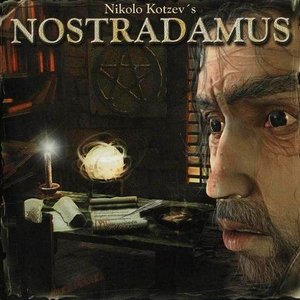
Published on Jan 9, 2002
There are three unwritten rules about rock musicals which I
believe to be absolutely true.
First, pulling off a successful rock musical is a miracle in and
of itself. Take the Broadway production of
Tommy for an example of how it can be done successfully.
Second, pulling off a rock musical which will probably never be
staged is near impossible. I don’t know of anyone trying to stage
Thing-Fish from Frank Zappa, but this one is a textbook
example of how quickly things can go wrong.
Third, pulling off a rock musical about a deep subject matter
which will probably never be staged – well, I once thought this was
about as likely as Pat Robertson and Harvey Fierstein dancing
cheek-to-cheek. But leave it to Finnish musician Nikolo Kotzev to
take a Don Quixote-like charge at such a concept – namely, a
progressive-rock spectacle based on the life of Nostradamus.
Does
Nikolo Kotzev’s Nostradamus succeed? Well, that depends on
your definition of “success,” doesn’t it?
Let’s first start with the strengths of this production.
Musically, Kotzev builds a structure that should be able to
withstand any criticism. The music is fresh and lively, even
keeping a medieval flavor which the subject matter absoutely
requires. By utilizing a 35-piece orchestra for the body of these
21 songs, Kotzev creates an atmosphere that makes the listener
almost feel like they’re looking in at the life and trials of one
Michel de Nostredame. It takes a skilled musician and songwriter to
pull such a feat off, and Kotzev does it well.
Second, the cast of singers he brings to the table is well
thought out. Ranging form the world of prog-rock (Joe Lynn Turner,
Glenn Hughes, Doogie White) to some surprising selections from the
pop-rock world (Alannah Myles, Sass Jordan), each singer seems to
be well matched to the character they play in this soundtrack. If I
had one minor complaint, though, I’d have miked the choir up a bit
more; often, some of the lines they sing are buried in the rich
musical background.
Now, the complaints. The first, which is a minor one, is that
one almost has to have the liner notes with them as they listen to
this set, just so they can understand exactly what is going on in
the plot. Of course, anyone who has done any reading about
Nostradamus (other than a magazine or encyclopedia article) will
have an easier time with the way Kotzev uncovers the action.
Story-wise, it sometimes feels like Kotzev glosses over certain
portions of Nostradamus’s life in order that significant time can
be spent on predictions for World Wars II and III, as well as the
end of the world. Possibly, had other prophecies which have
allegedly come true been addressed (other than the center of the
plot – his prediction of Henry II’s death), it might have seemed
like a more balanced approach. Instead, at times it almost feels
like the development of the story becomes bogged down by these
three major predictions. Possibly, had Kotzev combined them into
one work, this would have been more successful.
In fact, when the plot gets tied down, the interest level in the
whole production sags a bit. It’s not that Kotzev shouldn’t have
touched on these – and I’ll admit a strong case could be made for
the attention Kotzev gives them should this ever be staged, since
these could make some great theater – but that it’s too easy for
the listener to get overwhelmed by these, and subsequently find
themselves drifting away from the story and music.
One doesn’t spend four years working on something which doesn’t
have potential – and
Nikolo Kotzev’s Nostradamus does indeed have great
potential. I’m willing to bet that if this ever is staged, my
complaints about overreliance on certain predictions will be
reduced to dust. Until then, though, all we have to work with is
the soundtrack to a dream… which returns us to the original
question. Did Kotzev succeed with this work? The answer is yes,
though it’s not as strong a “yes” as I’d like to give it. (Then
again, had you asked me prior to this disc if a to-be-staged
musical based on Nostradamus would succeed, I’d have most likely
said “no” without giving it a second thought.)